Braided Lie algebras and bicovariant differential calculi over coquasitriangular Hopf algeb
- 格式:pdf
- 大小:576.76 KB
- 文档页数:42
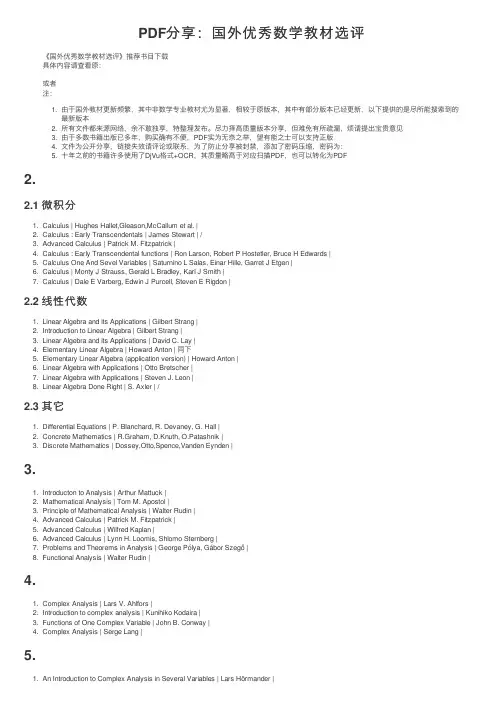
PDF分享:国外优秀数学教材选评《国外优秀数学教材选评》推荐书⽬下载具体内容请查看原:或者注:1. 由于国外教材更新频繁,其中⾮数学专业教材尤为显著,相较于原版本,其中有部分版本已经更新,以下提供的是尽所能搜索到的最新版本2. 所有⽂件都来源⽹络,余不敢独享,特整理发布。
尽⼒择⾼质量版本分享,但难免有所疏漏,烦请提出宝贵意见3. 由于多数书籍出版已多年,购买确有不便,PDF实为⽆奈之举,望有能之⼠可以⽀持正版4. ⽂件为公开分享,链接失效请评论或联系,为了防⽌分享被封禁,添加了密码压缩,密码为:5. ⼗年之前的书籍许多使⽤了DjVu格式+OCR,其质量略⾼于对应扫描PDF,也可以转化为PDF2.2.1 微积分1. Calculus | Hughes Hallet,Gleason,McCallum et al. |2. Calculus : Early Transcendentals | James Stewart | /3. Advanced Calculus | Patrick M. Fitzpatrick |4. Calculus : Early Transcendental functions | Ron Larson, Robert P Hostetler, Bruce H Edwards |5. Calculus One And Sevel Variables | Saturnino L Salas, Einar Hille, Garret J Etgen |6. Calculus | Monty J Strauss, Gerald L Bradley, Karl J Smith |7. Calculus | Dale E Varberg, Edwin J Purcell, Steven E Rigdon |2.2 线性代数1. Linear Algebra and its Applications | Gilbert Strang |2. Introduction to Linear Algebra | Gilbert Strang |3. Linear Algebra and its Applications | David C. Lay |4. Elementary Linear Algebra | Howard Anton | 同下5. Elementary Linear Algebra (application version) | Howard Anton |6. Linear Algebra with Applications | Otto Bretscher |7. Linear Algebra with Applications | Steven J. Leon |8. Linear Algebra Done Right | S. Axler | /2.3 其它1. Differential Equations | P. Blanchard, R. Devaney, G. Hall |2. Concrete Mathematics | R.Graham, D.Knuth, O.Patashnik |3. Discrete Mathematics | Dossey,Otto,Spence,Vanden Eynden |3.1. Introducton to Analysis | Arthur Mattuck |2. Mathematical Analysis | Tom M. Apostol |3. Principle of Mathematical Analysis | Walter Rudin |4. Advanced Calculus | Patrick M. Fitzpatrick |5. Advanced Calculus | Wilfred Kaplan |6. Advanced Calculus | Lynn H. Loomis, Shlomo Sternberg |7. Problems and Theorems in Analysis | George Po l ya, Ga b or Szego|8. Functional Analysis | Walter Rudin |4.1. Complex Analysis | Lars V. Ahlfors |2. Introduction to complex analysis | Kunihiko Kodaira |3. Functions of One Complex Variable | John B. Conway |4. Complex Analysis | Serge Lang |5.1. An Introduction to Complex Analysis in Several Variables | Lars Hörmander |2. Introduction to Complex Analysis Part II, Functions in Several Variables | B. V. Shabat |3. Topics in Complex Function Theory | Carl L. Siegel |6.1. Linear Algebra | K. Hoffmann and R. Kunze |2. Lectures on Linear Algebra | Gelfand |3. Linear Algebra Gems | David Carlson, Charles R. Johnson,David C. Lay, A. Duane Porter |4. Algebra | Michael Artin |5. Codes and Curves | Judy Walker |6. Introduction to Commutative Algebra | Michael Atiyah & I.G.MacDonald |7. Hopf Algebra | Moss E. Sweedler |7.1. Elementary Methods in Number Theory | Melvyn B.Nathanson |2. A Course in Arithmetic | J.-P. Serre |3. Introduction to Analytic Number Theory | Tom Apostol |8.1. An Invitation to Algebraic Geometry | K.Smith etc. |2. Introduction to Commutative Algebra and Algebraic Geometry | Ernst Kunz |3. Basic Algebraic Geometry | Shafarevich |4. Algebraic Geometry | Robin Hartshorne |5. Principles of Algebraic Geometry | Phillip Griffiths, Joseph Harris |6. The Red Book of Varieties and Schemes | David Mumford |7. Compact Complex Surfaces | W.P. Barth, K. Hulek, C.A.M. Peters, A. Van de Ven |9.1. Elements of Algebraic Topology | James R. Munkres |2. Lecture Notes on Elementary Topology and Geometry | Singer & Thorpe |3. Topology from the differentiable viewpoint | John Milnor |4. Algebraic topology | Hatcher |5. Differential forms in algebraic topology | Bott & Tu |6. Knot thoery | Livingston |7. Riemannian Geometry | M.P. Do Carmo |8. Foundations of Differential Geometry (in two volumes) | Shoshichi Kobayashi & Katsumi Nomizu |9. Introduction to Lie groups and Lie algebras | A.A.Sagle & R.E.Walde |10.1. Hyperbolic Partial Differential Equations | Peter D. Lax |2. Partial Differential Equations, An Introduction | Walter A. Strauss |3. Partial Differential Equations | Lawrence C. Evans |4. Partial Differential Equations | Fritz John |11.1. An Introduction to probability theory and its applications, Vol 1 | William Feller |2. A course in Probability Theory | Kai Lai Chung |12.1. Numerical Optimization | J. Nocedal & S. Wright |13.1. Berkeley Problems in Mathematics | Souza & Silva |2. Putnam and Beyond | Gelca & Andreescu |另外推荐:。
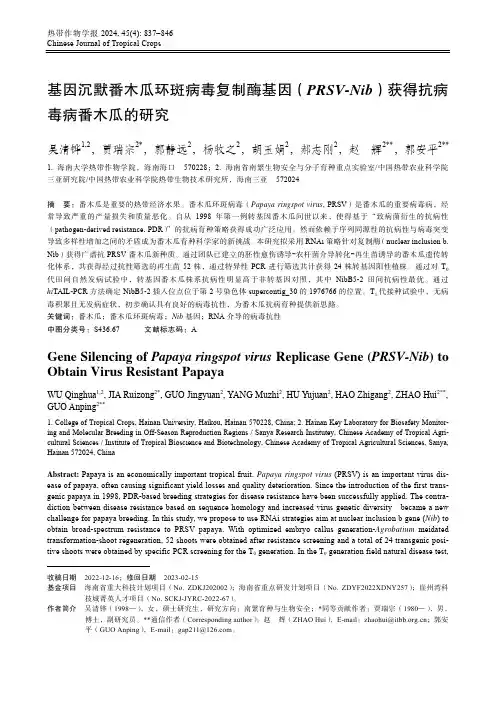
热带作物学报2024, 45(4): 837 846Chinese Journal of Tropical Crops基因沉默番木瓜环斑病毒复制酶基因(PRSV-Nib)获得抗病毒病番木瓜的研究吴清铧1,2,贾瑞宗2*,郭静远2,杨牧之2,胡玉娟2,郝志刚2,赵辉2**,郭安平2** 1. 海南大学热带作物学院,海南海口 570228;2. 海南省南繁生物安全与分子育种重点实验室/中国热带农业科学院三亚研究院/中国热带农业科学院热带生物技术研究所,海南三亚 572024摘要:番木瓜是重要的热带经济水果。
番木瓜环斑病毒(Papaya ringspot virus, PRSV)是番木瓜的重要病毒病,经常导致严重的产量损失和质量恶化。
自从1998年第一例转基因番木瓜问世以来,使得基于“致病菌衍生的抗病性(pathogen-derived resistance, PDR)”的抗病育种策略获得成功广泛应用。
然而依赖于序列同源性的抗病性与病毒突变导致多样性增加之间的矛盾成为番木瓜育种科学家的新挑战。
本研究拟采用RNAi策略针对复制酶(nuclear inclusion b. Nib)获得广谱抗PRSV番木瓜新种质。
通过团队已建立的胚性愈伤诱导-农杆菌介导转化-再生苗诱导的番木瓜遗传转化体系,共获得经过抗性筛选的再生苗52株,通过特异性PCR进行筛选共计获得24株转基因阳性植株。
通过对T0代田间自然发病试验中,转基因番木瓜株系抗病性明显高于非转基因对照,其中NibB5-2田间抗病性最优。
通过hi TAIL-PCR方法确定NibB5-2插入位点位于第2号染色体supercontig_30的1976766的位置。
T1代接种试验中,无病毒积累且无发病症状,初步确认具有良好的病毒抗性,为番木瓜抗病育种提供新思路。
关键词:番木瓜;番木瓜环斑病毒;Nib基因;RNA介导的病毒抗性中图分类号:S436.67 文献标志码:AGene Silencing of Papaya ringspot virus Replicase Gene (PRSV-Nib) to Obtain Virus Resistant PapayaWU Qinghua1,2, JIA Ruizong2*, GUO Jingyuan2, YANG Muzhi2, HU Yujuan2, HAO Zhigang2, ZHAO Hui2**, GUO Anping2**1. College of Tropical Crops, Hainan University, Haikou, Hainan 570228, China;2. Hainan Key Laboratory for Biosafety Monitor-ing and Molecular Breeding in Off-Season Reproduction Regions / Sanya Research Institutey, Chinese Academy of Tropical Agri-cultural Sciences / Institute of Tropical Bioscience and Biotechnology, Chinese Academy of Tropical Agricultural Sciences, Sanya, Hainan 572024, ChinaAbstract: Papaya is an economically important tropical fruit. Papaya ringspot virus (PRSV) is an important virus dis-ease of papaya, often causing significant yield losses and quality deterioration. Since the introduction of the first trans-genic papaya in 1998, PDR-based breeding strategies for disease resistance have been successfully applied. The contra-diction between disease resistance based on sequence homology and increased virus genetic diversity became a new challenge for papaya breeding. In this study, we propose to use RNAi strategies aim at nuclear inclusion b gene (Nib) to obtain broad-spectrum resistance to PRSV papaya. With optimized embryo callus generation-Agrobatium meidated transformation-shoot regeneration, 52 shoots were obtained after resistance screening and a total of 24 transgenic posi-tive shoots were obtained by specific PCR screening for the T0 generation. In the T0 generation field natural disease test, 收稿日期 2022-12-16;修回日期 2023-02-15基金项目 海南省重大科技计划项目(No. ZDKJ202002);海南省重点研发计划项目(No. ZDYF2022XDNY257);崖州湾科技城菁英人才项目(No. SCKJ-JYRC-2022-67)。
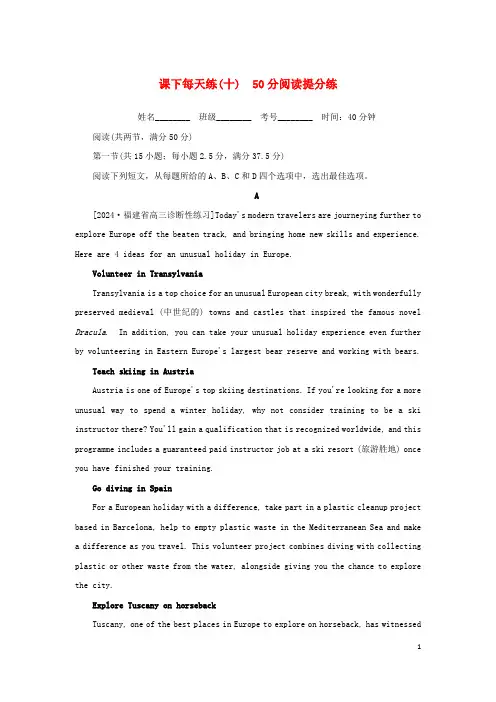
课下每天练(十) 50分阅读提分练姓名________ 班级________ 考号________ 时间:40分钟阅读(共两节,满分50分)第一节(共15小题;每小题2.5分,满分37.5分)阅读下列短文,从每题所给的A、B、C和D四个选项中,选出最佳选项。
A[2024·福建省高三诊断性练习]Today's modern travelers are journeying further to explore Europe off the beaten track, and bringing home new skills and experience. Here are 4 ideas for an unusual holiday in Europe.Volunteer in TransylvaniaTransylvania is a top choice for an unusual European city break, with wonderfully preserved medieval (中世纪的) towns and castles that inspired the famous novel Dracula. In addition, you can take your unusual holiday experience even further by volunteering in Eastern Europe's largest bear reserve and working with bears.Teach skiing in AustriaAustria is one of Europe's top skiing destinations. If you're looking for a more unusual way to spend a winter holiday, why not consider training to be a ski instructor there? You'll gain a qualification that is recognized worldwide, and this programme includes a guaranteed paid instructor job at a ski resort (旅游胜地) once you have finished your training.Go diving in SpainFor a European holiday with a difference, take part in a plastic cleanup project based in Barcelona, help to empty plastic waste in the Mediterranean Sea and make a difference as you travel. This volunteer project combines diving with collecting plastic or other waste from the water, alongside giving you the chance to explore the city.Explore Tuscany on horsebackTuscany, one of the best places in Europe to explore on horseback, has witnesseda sharp increase in travelers. There are various activities that combine sightseeing with basic horse riding lessons and you can stay in Renaissance villas (文艺复兴风格的别墅) and farmhouses. You don't need to have any experience for horse riding holidays, and they are a brilliant alternative to your typical guided tour.1.What does the author suggest doing in Transylvania?A.Helping to care for bears.B.Finding a job in the castle.C.Reading the novel Dracula.D.Visiting its modern buildings.2.Where can you earn money while traveling?A.Transylvania. B.Tuscany.C.Spain. D.Austria.3.What do we know about horse riding holidays in Tuscany?A.They suit experienced riders.B.They are unique to Tuscany.C.They are growing in popularity.D.They feature a typical guided tour.B[2024·广东七校联考试卷]Overlooking the DavisGant Varsity Soccer Field, a bed of overturned soil waits for further development. In a few years, this area will become a natural habitat and a playground for animals and residents. This peaceful area didn't appear naturally, but through planning and action taken by Catlin Gabel's Tiny Forest project launched by teacher Patrick Walsh.Forests typically take hundreds of years to mature, with four stages of growth. “Tiny forests flatten out time through the plant ing of all four layers (层),” Walsh explained. The end result is a fastgrowing, native forest in about 20 years. Over 600 plants from 43 species will be planted in the tiny forest, the first one in Oregon.Walsh was inspired to build a tiny forest after hearing about this idea, which emerged in Japan and has taken hold in North America. He shared his vision withseniors in his class. The seniors researched tiny forests and made a proposal resulting in Clean Water Services donating 60 trees and $5,000 from the National Oceanic and Atmospheric Administration. Armed with these resources, Walsh and the students started working. “Something I didn't really expect was the outpouring of students' enthusiasm. Seeing students from all grades volunteered to contribute to the ‘dirty work’ really blew me away,” Walsh said.Senior Megan Cover has been at the school since the first grade. “I'll graduate after working on this project, which is surely sad, but it's really rewarding and great to be a part of this project and to do my bit. We're creating this educational space for many young kids,” Cover said.Walsh summed up his goal of the project, which is to build a place where students can enjoy and learn about nature. “The forest will obviously not solve climate change, but it would deserve the efforts if the kids think about climate change and remember the importance of reforestation and trees when they look outside at the forest.”4.What is special about tiny forests?A.They originated in North America.B.They are usually planted in schools.C.They contain various types of trees.D.They become mature in a shorter time.5.What surprised Walsh in the process of planting the tiny forest?A.The abundance of native tree species.B. Public concern about the environment.C.The active participation of students.D.Support from local organizations.6.How does Megan Cover feel about the project?A.Proud. B.Hopeful.C.Excited. D.Grateful.7.What does Walsh want the forest to function as for the students?A.A source of enjoyment.B.A reminder.C.A source of inspiration.D.A witness.C[2024·唐山市模拟]Math anxiety is far from uncommon, but too often, those who fear the subject simply avoid it. Research from The University of Chicago offers evidence for the link between math anxiety and avoidance.Studying nearly 500 adults through a computer program called the ChooseAndSolve Task (CAST), the researchers gave participants a choice between math and word problems labeled “easy” and “hard”. The easy problems were always worth two cents, while the hard problems were worth up to six cents. They also informed participants the computer task would modify the questions in the process of testing based on their abilities, enabling them to handle about 70% of the hard problems.Although participants attempted hard word problems when promised higher monetary prizes, they rarely chose to do the same for math problems. “We found we couldn't even pay mathanxious individuals to do difficult math problems,” researcher Rozek says.The findings also contradict a widely held belief that feeling anxious about math and avoiding mathrelated problems is rooted in being bad at math. “If you take two students good at math, the mathanxious one will do worse at math than the one that isn't anxious.”Such a mentality does more than stopping people from taking calculus courses or pursuing a career in STEM. It can affect everyday interactions with math—like leaving a tip in a restaurant. But all is not lost. Reframing their anxiety from negative to positive cou ld help mathanxious people reengage. Giving those anxious about siting exams guidance may lead them to perform better. “Telling them if you're anxious, this is your body getting you ready to perform and focus,” Rozek says. Another path may be to create early positive experiences around math. For example, telling stories featuring math and tackling problems around the story may be helpful.8.What does the underlined word “modify” mean in Paragraph 2?A.Adjust. B.Design.C.Solve. D.Add.9.What does the study find?A.Math anxiety interacts with math avoidance.B.Word problems are often regarded as easier.C.Fear of math can outweigh higher rewards.D.People underrate their mathematical ability.10.What is a common misunderstanding about math anxiety?A.It is the cause of math avoidance.B.It causes people to be bored of math.C.It is a complex phenomenon in life.D.It results from poor math performance.11.What is the last paragraph mainly about?A.Consequences of math avoidance.B.Ways to break the anx ietyavoidance link.C.Explanations for math anxiety.D.Mental barriers to mathematical achievements.D[2024·厦门市高三质量检测]The burning of coal may be falling out of favor as a means of generating heat and electricity, but that doesn't mean it no longer has valuable uses. The team of King Abdullah University of Science and Technology (KAUST) is using coal for a new economy.The project is led by Associate Professor Andrea Fratalocchi. While reading about challenges of ending the use of coal in power generation, Fratalocchi was struck by a novel possible use for coal. “Why don't we use coal for seawater desalination (脱盐)?” Fratalocchi recalls, still excited. Capable of taking in sunlight, the black mineral adds to the list of substances in dark colors serving t he purpose, which the team is on a longstanding hunt for.Fratalocchi and his team began to explore the use of a material known ascarbonized compressed powder (压缩粉末), also CCP, which is created by breaking coal into powder, and then pressing that powder back into a solid that has more tiny holes—it can also be made into a desired shape. The team combined CCP with natural cotton fibers, producing a block which was then placed within a seawater containing container, with its bottom touching water surface. While sunlight heated the black surface of the block, the inside fibers helped water flow in and through the block from the bottom. When that liquid water reached the hot surface, it turned into steam which rose and condensed (冷凝) on the inside of a specially shaped cover. That condensation then flew down the cover and was collected as fresh, drinkable water. The seawater's salt content remained behind within the CCP. A simple wash was enough to remove most of it, so the material could be reused multiple times.KAUST has partnered with the Dutch startup PERA Complexity to promote the technology. The material will see its first use in a pilot plant in Brazil. “CCP is abundant in nature and reasonable to use, besides being lightweight and highly changeable,” says team member Marcella Bonifazi. “The device's desalination rate per unit of raw material is two to three times higher than that of any other solar desalination system, but it produces fresh water at around onethird the expense of current stateoftheart technologies.”12.What is Fratalocchi's team seeking for?A.Fibers functioning well with CCP.B.Green ways to desalinate seawater.C.Novel industrial applications of coal.D.Darkcolored materials for desalination.13.How did the team get water into the CCP device?A.By placing cotton fibers inside.B.By heating its black surface.C.By making the powder into a block.D.By installing a special cover.14.Which feature of CCP does Marcella Bonifazi stress?A.Being ecofriendly. B.Being lowcost.C.Being efficient. D.Being flexible.15.What does the text mainly talk about?A.Scientists have made a breakthrough in desalination.B.Coal finds new use in desalination technology.P is expected to be in reallife use soon.D.Drinkable water will be got from the sea.其次节(共5小题;每小题2.5分,满分12.5分)阅读下面短文,从短文后的选项中选出可以填入空白处的最佳选项。
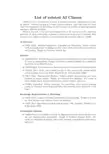
List of related AI Classes CS229covered a broad swath of topics in machine learning,compressed into a sin-gle quarter.Machine learning is a hugely inter-disciplinary topic,and there are many other sub-communities of AI working on related topics,or working on applying machine learning to different problems.Stanford has one of the best and broadest sets of AI courses of pretty much any university.It offers a wide range of classes,covering most of the scope of AI issues.Here are some some classes in which you can learn more about topics related to CS229:AI Overview•CS221(Aut):Artificial Intelligence:Principles and Techniques.Broad overview of AI and applications,including robotics,vision,NLP,search,Bayesian networks, and learning.Taught by Professor Andrew Ng.Robotics•CS223A(Win):Robotics from the perspective of building the robot and controlling it;focus on manipulation.Taught by Professor Oussama Khatib(who builds the big robots in the Robotics Lab).•CS225A(Spr):A lab course from the same perspective,taught by Professor Khatib.•CS225B(Aut):A lab course where you get to play around with making mobile robots navigate in the real world.Taught by Dr.Kurt Konolige(SRI).•CS277(Spr):Experimental Haptics.Teaches haptics programming and touch feedback in virtual reality.Taught by Professor Ken Salisbury,who works on robot design,haptic devices/teleoperation,robotic surgery,and more.•CS326A(Latombe):Motion planning.An algorithmic robot motion planning course,by Professor Jean-Claude Latombe,who(literally)wrote the book on the topic.Knowledge Representation&Reasoning•CS222(Win):Logical knowledge representation and reasoning.Taught by Profes-sor Yoav Shoham and Professor Johan van Benthem.•CS227(Spr):Algorithmic methods such as search,CSP,planning.Taught by Dr.Yorke-Smith(SRI).Probabilistic Methods•CS228(Win):Probabilistic models in AI.Bayesian networks,hidden Markov mod-els,and planning under uncertainty.Taught by Professor Daphne Koller,who works on computational biology,Bayes nets,learning,computational game theory, and more.1Perception&Understanding•CS223B(Win):Introduction to computer vision.Algorithms for processing and interpreting image or camera information.Taught by Professor Sebastian Thrun, who led the DARPA Grand Challenge/DARPA Urban Challenge teams,or Pro-fessor Jana Kosecka,who works on vision and robotics.•CS224S(Win):Speech recognition and synthesis.Algorithms for large vocabu-lary continuous speech recognition,text-to-speech,conversational dialogue agents.Taught by Professor Dan Jurafsky,who co-authored one of the two most-used textbooks on NLP.•CS224N(Spr):Natural language processing,including parsing,part of speech tagging,information extraction from text,and more.Taught by Professor Chris Manning,who co-authored the other of the two most-used textbooks on NLP.•CS224U(Win):Natural language understanding,including computational seman-tics and pragmatics,with application to question answering,summarization,and inference.Taught by Professors Dan Jurafsky and Chris Manning.Multi-agent systems•CS224M(Win):Multi-agent systems,including game theoretic foundations,de-signing systems that induce agents to coordinate,and multi-agent learning.Taught by Professor Yoav Shoham,who works on economic models of multi-agent interac-tions.•CS227B(Spr):General game playing.Reasoning and learning methods for playing any of a broad class of games.Taught by Professor Michael Genesereth,who works on computational logic,enterprise management and e-commerce.Convex Optimization•EE364A(Win):Convex Optimization.Convexity,duality,convex programs,inte-rior point methods,algorithms.Taught by Professor Stephen Boyd,who works on optimization and its application to engineering problems.AI Project courses•CS294B/CS294W(Win):STAIR(STanford AI Robot)project.Project course with no lectures.By drawing from machine learning and all other areas of AI, we’ll work on the challenge problem of building a general-purpose robot that can carry out home and office chores,such as tidying up a room,fetching items,and preparing meals.Taught by Professor Andrew Ng.2。
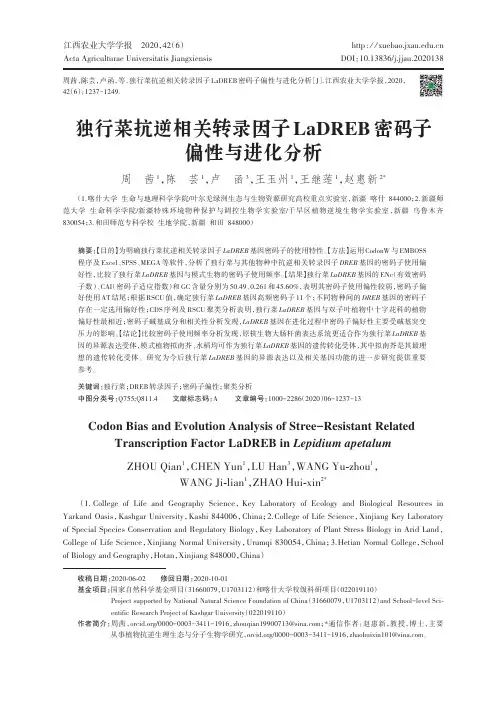
2020,42(6)DOI :10.13836/j.jjau.2020138江西农业大学学报Acta Agriculturae Universitatis Jiangxiensishttp ://独行菜抗逆相关转录因子LaDREB 密码子偏性与进化分析周茜1,陈芸1,卢函3,王玉州1,王继莲1,赵惠新2*(1.喀什大学生命与地理科学学院/叶尔羌绿洲生态与生物资源研究高校重点实验室,新疆喀什844000;2.新疆师范大学生命科学学院/新疆特殊环境物种保护与调控生物学实验室/干旱区植物逆境生物学实验室,新疆乌鲁木齐830054;3.和田师范专科学校生地学院,新疆和田848000)摘要:【目的】为明确独行菜抗逆相关转录因子LaDREB 基因密码子的使用特性。
【方法】运用CodonW 与EMBOSS 程序及Excel 、SPSS 、MEGA 等软件,分析了独行菜与其他物种中抗逆相关转录因子DREB 基因的密码子使用偏好性,比较了独行菜LaDREB 基因与模式生物的密码子使用频率。
【结果】独行菜LaDREB 基因的ENc (有效密码子数)、CAI (密码子适应指数)和GC 含量分别为50.49、0.261和45.60%,表明其密码子使用偏性较弱,密码子偏好使用AT 结尾;根据RSCU 值,确定独行菜LaDREB 基因高频密码子11个;不同物种间的DREB 基因的密码子存在一定选用偏好性;CDS 序列及RSCU 聚类分析表明,独行菜LaDREB 基因与双子叶植物中十字花科的植物偏好性最相近;密码子碱基成分和相关性分析发现,LaDREB 基因在进化过程中密码子偏好性主要受碱基突变压力的影响。
【结论】比较密码子使用频率分析发现,原核生物大肠杆菌表达系统更适合作为独行菜LaDREB 基因的异源表达受体,模式植物拟南芥、水稻均可作为独行菜LaDREB 基因的遗传转化受体,其中拟南芥是其最理想的遗传转化受体。
研究为今后独行菜LaDREB 基因的异源表达以及相关基因功能的进一步研究提供重要参考。
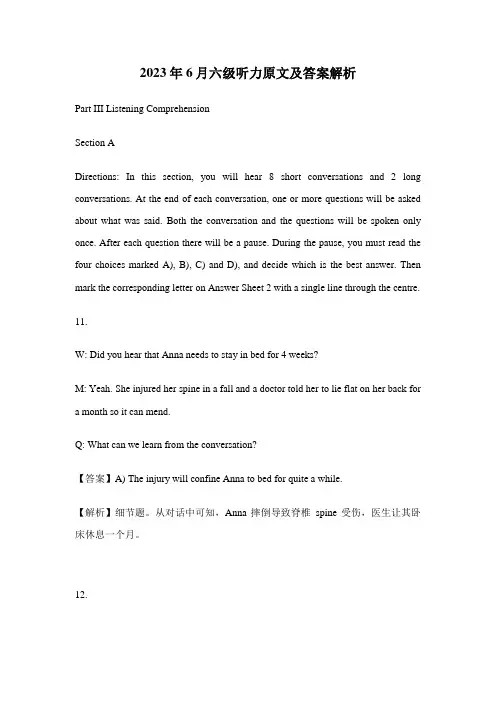
2023年6月六级听力原文及答案解析Part III Listening ComprehensionSection ADirections: In this section, you will hear 8 short conversations and 2 long conversations. At the end of each conversation, one or more questions will be asked about what was said. Both the conversation and the questions will be spoken only once. After each question there will be a pause. During the pause, you must read the four choices marked A), B), C) and D), and decide which is the best answer. Then mark the corresponding letter on Answer Sheet 2 with a single line through the centre.11.W: Did you hear that Anna needs to stay in bed for 4 weeks?M: Yeah. She injured her spine in a fall and a doctor told her to lie flat on her back for a month so it can mend.Q: What can we learn from the conversation?【答案】A) The injury will confine Anna to bed for quite a while.【解析】细节题。
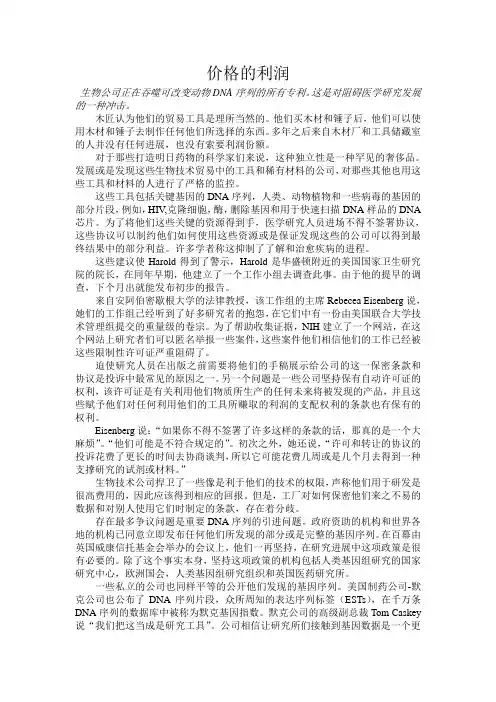
价格的利润生物公司正在吞噬可改变动物DNA序列的所有专利。
这是对阻碍医学研究发展的一种冲击。
木匠认为他们的贸易工具是理所当然的。
他们买木材和锤子后,他们可以使用木材和锤子去制作任何他们所选择的东西。
多年之后来自木材厂和工具储藏室的人并没有任何进展,也没有索要利润份额。
对于那些打造明日药物的科学家们来说,这种独立性是一种罕见的奢侈品。
发展或是发现这些生物技术贸易中的工具和稀有材料的公司,对那些其他也用这些工具和材料的人进行了严格的监控。
这些工具包括关键基因的DNA序列,人类、动物植物和一些病毒的基因的部分片段,例如,HIV,克隆细胞,酶,删除基因和用于快速扫描DNA样品的DNA 芯片。
为了将他们这些关键的资源得到手,医学研究人员进场不得不签署协议,这些协议可以制约他们如何使用这些资源或是保证发现这些的公司可以得到最终结果中的部分利益。
许多学者称这抑制了了解和治愈疾病的进程。
这些建议使Harold得到了警示,Harold是华盛顿附近的美国国家卫生研究院的院长,在同年早期,他建立了一个工作小组去调查此事。
由于他的提早的调查,下个月出就能发布初步的报告。
来自安阿伯密歇根大学的法律教授,该工作组的主席Rebecea Eisenberg说,她们的工作组已经听到了好多研究者的抱怨,在它们中有一份由美国联合大学技术管理组提交的重量级的卷宗。
为了帮助收集证据,NIH建立了一个网站,在这个网站上研究者们可以匿名举报一些案件,这些案件他们相信他们的工作已经被这些限制性许可证严重阻碍了。
迫使研究人员在出版之前需要将他们的手稿展示给公司的这一保密条款和协议是投诉中最常见的原因之一。
另一个问题是一些公司坚持保有自动许可证的权利,该许可证是有关利用他们物质所生产的任何未来将被发现的产品,并且这些赋予他们对任何利用他们的工具所赚取的利润的支配权利的条款也有保有的权利。
Eisenberg说:“如果你不得不签署了许多这样的条款的话,那真的是一个大麻烦”。
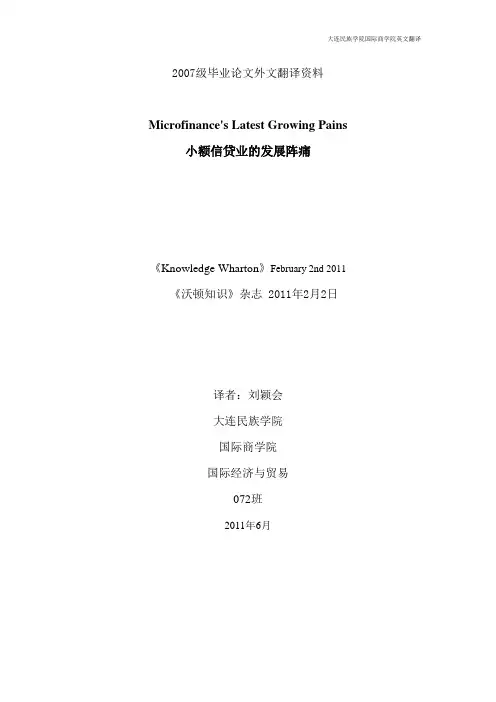
大连民族学院国际商学院英文翻译2007级毕业论文外文翻译资料Microfinance's Latest Growing Pains小额信贷业的发展阵痛《Knowledge Wharton》February 2nd 2011《沃顿知识》杂志 2011年2月2日译者:刘颖会大连民族学院国际商学院国际经济与贸易072班2011年6月小额信贷业发展阵痛近期的小额信贷危机源于印度南部城市安得拉邦,当地过度负债、暴力催款和借款者被迫自杀等问题引发了民众对小额信贷行业的广泛指责,并强烈呼吁政府加强监管。
10月,印度政府对损害信贷、强行控制回款天数并拖累印度最大的盈利性小额信贷公司SKS股价暴跌的小额信贷机构实施管制。
1月19日,印度储备银行发布Malegam委员会报告,建议对印度小额信贷机构施加一系列新的监管措施,包括设置利率上限、贷款限额以及对借款人的收入进行规定。
有些观察家对此表示欢迎,而悲观人士则认为此举难以避免信贷紧缩和行业崩溃。
尽管现在要分析行业前景还为时尚早,但安得拉邦的危机着实引发了民众对全球小额信贷行业的热烈讨论和深刻反省。
近期在沃顿阿瑞斯高级管理教育学院小额信贷管理培训班上,讨论的焦点集中在过度信贷、高速的行业增长以及如何在追求利润的同时更好地实现小额信贷的设立宗旨。
小额信贷业经历了一场由坏账“大地震”所引发的“痛苦的觉醒”,26名来自全球各地的社会财富计划参与者之一Kamran Azim在一堂主题为小额信贷业的增长与可持续发展的讨论中如此比喻道。
Azim是创立于1996年的巴基斯坦拉合尔小额信贷机构Kashf 基金的运营总监。
他指出,过去20到30年间,小额信贷的方式方法几乎都没有发生过变化。
但现在,突然之间,这个行业经历了一场地震。
正如该培训计划中一门课程的导言所说:“面对不断加速的变革,人们趋向于依赖传统的方式进行商业发展。
然而,正是在这样的时刻,创新方显得尤为重要。
”此外,几名学员也指出,小额信贷行业必须在兼顾客户需求的同时通过创新的方式来巩固发展。
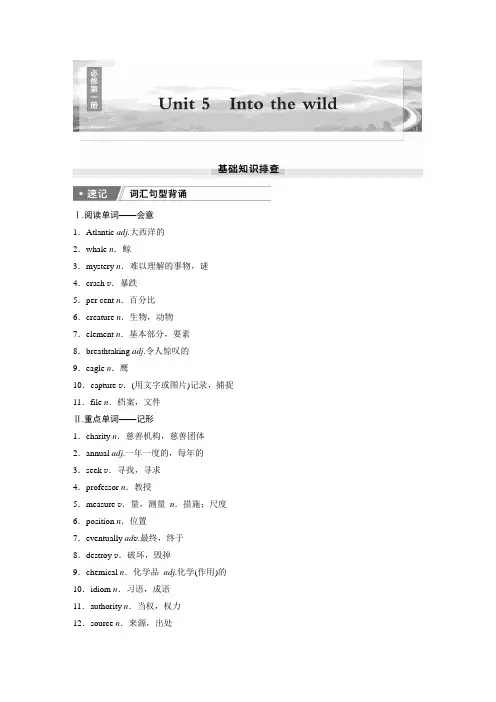
Ⅰ.阅读单词——会意1.Atlantic adj.大西洋的2.whale n.鲸3.mystery n.难以理解的事物,谜4.crash v.暴跌5.per cent n.百分比6.creature n.生物,动物7.element n.基本部分,要素8.breathtaking adj.令人惊叹的9.eagle n.鹰10.capture v.(用文字或图片)记录,捕捉11.file n.档案,文件Ⅱ.重点单词——记形1.charity n.慈善机构,慈善团体2.annual adj.一年一度的,每年的3.seek v.寻找,寻求4.professor n.教授5.measure v.量,测量n.措施;尺度6.position n.位置7.eventually ad v.最终,终于8.destroy v.破坏,毁掉9.chemical n.化学品adj.化学(作用)的10.idiom n.习语,成语11.authority n.当权,权力12.source n.来源,出处13.found v.创立,创建14.button n.按钮15.encounter v.意外地遇见,与……邂逅n.意外的相遇,邂逅16.path n.小径,小道17.stare v.凝视,盯着看18.image n.图像,影像Ⅲ.拓展单词——悉变1.migrate v.移栖,迁徙→migration n.迁徙2.determine v.测定,确定→determined adj.坚决的;有决心的→determination n.决心;果断3.solution n.解决,解决方法→solve v t.解决4.amazing adj.惊人的,了不起的→amaze v.使惊讶→amazed adj.惊讶的→amazement n.惊奇;惊愕5.survive v.活下来,幸存→survival n.幸存;残存物→survivor n.幸存者;生还者6.effect n.影响,结果→effective adj.有效的;有影响的7.accommodation n.住处,工作场所→accommodate v.容纳;提供住宿8.photographer n.摄影师→photograph n.照片v i.& v t.(为……)拍照→photography n.摄影;摄影术9.recover v.(从糟糕经历中)恢复→recovery n.恢复10.shock n.吃惊,震惊→shocking adj.令人震惊的→shocked adj.感到震惊的11.variety n.多样化,变化→various adj.多种多样的→vary v i.变化;不同12.concentrate v.专注,专心→concentration n.专心→concentrated adj.全力以赴的;集中的13.freeze v.(froze,frozen) 突然停止,呆住;结冰;(使)冻住→freezing adj.极冷的;冰冻的→frozen adj.结冰的;冻僵的;冷冻的14.reaction n.(对某一情形或事件的)反应→react v i.做出反应;回应1.endow /I n'daʊ/v t.捐赠;资助be endowed with天生具备2.array /ə're I/n.大量;大群;阵列v t.布置;排列3.thread /θred/n.线;思路;线状物v t.& v i.穿(针);穿过4.beam /biːm/n.光线;束;梁v i.& v t.照射;发光;发热5.stickiness /'st I kinəs/n.黏性→sticky /'st I ki/adj.黏的;闷热的;难办的6.attribute /'ætr I bjuːt/n.属性;性质;特征/ə'tr I bjuːt/v t.把……归因于;认为是……所为7.forth /fɔːθ/ad v.向前;离去call forth使产生;引起8.circulate /'sɜːkjəle I t/v i.& v t.循环;传播9.evaporate /I'væpəre I t/v i.& v t.(使)蒸发;挥发10.moisture /'mɔI stʃə(r)/n.潮气;水汽;水分Ⅳ.背核心短语1.flow chart流程图,作业图2.kill two birds with one stone一举两得,一箭双雕3.hold your horses慢点,别急4.rain cats and dogs下倾盆大雨5.brave the elements不顾天气恶劣,冒着风雨6.after all毕竟,终究7.manage to do sth成功做某事8.the solution to...……的解决办法9.at a speed of以……的速度10.show respect to尊重11.cut down 砍倒;减少12.feed on以……为食13.concentrate on把注意力集中于,全神贯注于14.fall off从……掉下来15.recover from从……恢复16.from time to time不时,偶尔Ⅴ.悟经典句式1.The solution to the mystery of the monarch’s amazing ability comes at a time when it is in serious trouble.(when引导定语从句)黑脉金斑蝶这一惊人能力的奥秘被揭开时,这一生物正处于水深火热的生存状态中。
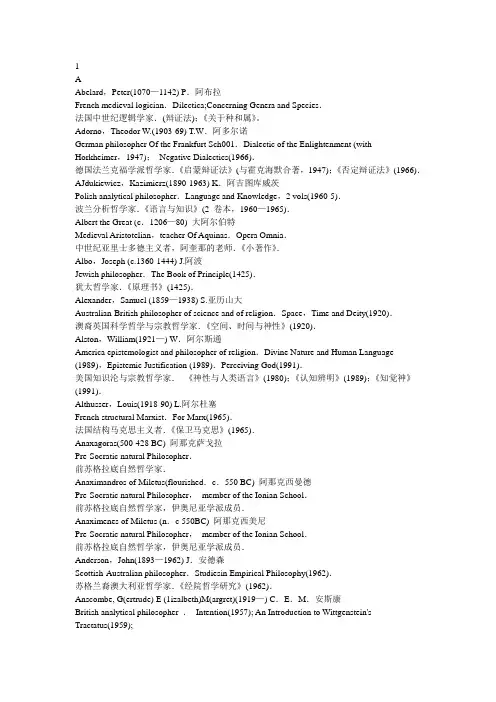
1AAbelard,Peter(1070—1142) P.阿布拉French medieval logician.Dilectica;Concerning Genera and Species.法国中世纪逻辑学家.(辩证法);《关于种和属》。
Adorno,Theodor W.(1903-69) T.W.阿多尔诺German philosopher Of the Frankfurt Sch001.Dialectic of the Enlightenment (with Horkheimer,1947);Negative Dialectics(1966).德国法兰克福学派哲学家.《启蒙辩证法》(与霍克海默合著,1947);《否定辩证法》(1966).AJdukiewicz,Kazimierz(1890-1963) K.阿吉图库威茨Polish analytical philosopher.Language and Knowledge,2 vols(1960-5).波兰分析哲学家.《语言与知识》(2 卷本,1960—1965).Albert the Great (c.1206—80) 大阿尔伯特Medieval Aristotelian,teacher Of Aquinas.Opera Omnia.中世纪亚里士多德主义者,阿奎那的老师.《小著作》.Albo,Joseph (c.1360-1444) J.阿波Jewish philosopher.The Book of Principle(1425).犹太哲学家.《原理书》(1425).Alexander,Samuel (1859—1938) S.亚历山大Australian-British philosopher of science and of religion.Space,Time and Deity(1920).澳裔英国科学哲学与宗教哲学家.《空间、时间与神性》(1920).Alston,William(1921—) W.阿尔斯通America epistemologist and philosopher of religion.Divine Nature and Human Language (1989),Epistemic Justification (1989).Perceiving God(1991).美国知识沦与宗教哲学家.《神性与人类语言》(1980);《认知辨明》(1989);《知觉神》(1991).Althusser,Louis(1918-90) L.阿尔杜塞French structural Marxist.For Marx(1965).法国结构马克思主义者.《保卫马克思》(1965).Anaxagoras(500-428 BC) 阿那克萨戈拉Pre-Socratic natural Philosopher.前苏格拉底自然哲学家.Anaximandros of Miletus(flourished.c.550 BC) 阿那克西曼德Pre-Socratic natural Philosopher,member of the Ionian School.前苏格拉底自然哲学家,伊奥尼亚学派成员.Anaximenes of Miletus (n.c 550BC) 阿那克西美尼Pre-Socratic natural Philosopher,member of the Ionian School.前苏格拉底自然哲学家,伊奥尼亚学派成员.Anderson,John(1893—1962) J.安德森Scottish-Australian philosopher.Studiesin Empirical Philosophy(1962).苏格兰裔澳大利亚哲学家.《经院哲学研究》(1962).Anscombe, G(ertrude) E (1izalbeth)M(argret)(1919—) C.E.M.安斯康British analytical philosopher .Intention(1957); An Introduction to Wittgenstein'sTractatus(1959);PDF 文件使用"pdfFactory" 试用版本创建2Collected Philosophical Papers(3 vols.1981).英国分析哲学家.《意向》(1957);《维特根斯坦(逻辑哲学论>导论)(1959);《哲学论文集》(3 卷本,1981)。
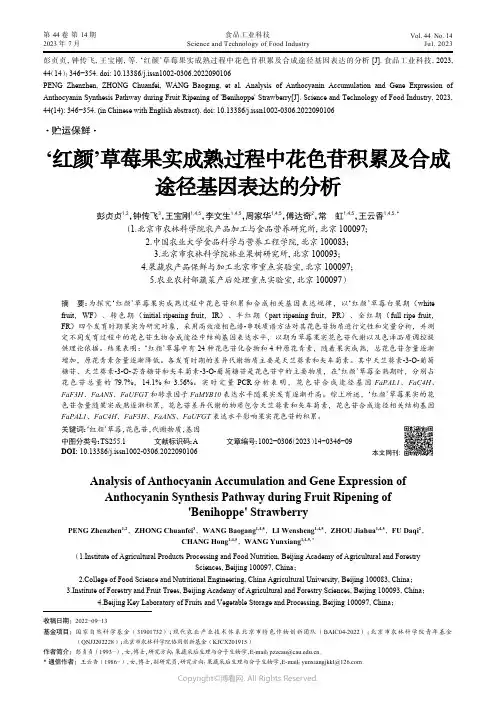
彭贞贞,钟传飞,王宝刚,等. ‘红颜’草莓果实成熟过程中花色苷积累及合成途径基因表达的分析[J]. 食品工业科技,2023,44(14):346−354. doi: 10.13386/j.issn1002-0306.2022090106PENG Zhenzhen, ZHONG Chuanfei, WANG Baogang, et al. Analysis of Anthocyanin Accumulation and Gene Expression of Anthocyanin Synthesis Pathway during Fruit Ripening of 'Benihoppe' Strawberry[J]. Science and Technology of Food Industry, 2023,44(14): 346−354. (in Chinese with English abstract). doi: 10.13386/j.issn1002-0306.2022090106· 贮运保鲜 ·‘红颜’草莓果实成熟过程中花色苷积累及合成途径基因表达的分析彭贞贞1,2,钟传飞3,王宝刚1,4,5,李文生1,4,5,周家华1,4,5,傅达奇2,常 虹1,4,5,王云香1,4,5,*(1.北京市农林科学院农产品加工与食品营养研究所,北京 100097;2.中国农业大学食品科学与营养工程学院,北京 100083;3.北京市农林科学院林业果树研究所,北京 100093;4.果蔬农产品保鲜与加工北京市重点实验室,北京 100097;5.农业农村部蔬菜产后处理重点实验室,北京 100097)摘 要:为探究‘红颜’草莓果实成熟过程中花色苷积累和合成相关基因表达规律,以‘红颜’草莓白果期(white fruit ,WF )、转色期(initial ripening fruit ,IR )、半红期(part ripening fruit ,PR )、全红期(full ripe fruit ,FR )四个发育时期果实为研究对象,采用高效液相色谱-串联质谱方法对其花色苷物质进行定性和定量分析,并测定不同发育过程中的花色苷生物合成途径中结构基因表达水平,以期为草莓果实花色苷代谢以及色泽品质调控提供理论依据。
高三年级暑期英语练习2024.08第一部分听力(共两节,满分30分)第一节(共5小题;每小题1.5分,满分7.5分)听下面5段对话。
每段对话后有一个小题,从题中所给的A、B、C三个选项中选出最佳选项。
听完每段对话后,你都有10秒钟的时间来回答有关小题和阅读下一小题。
每段对话仅读一遍。
1. Where does this conversation probably take place?A. At a bus stop.B. At school.C. At home.2. What will the speakers do next?A. Order food.B. Ask for the menu.C. Leave the restaurant.3. Why does the man make the phone call?A. To cancel a visit.B. To make an appointment.C. To give some information.4. What did the speakers do last week?A. They stayed at a hotel.B. They moved their house.C. They made a special meal.5. What is probably the woman?A. A student.B. A teacher.C. A stay-at-home mother.第二节(共15题;每小题1.5分,满分22.5分)听下面5段对话或独白。
每段对话或独白后有几个小题,从题中所给的A、B、C三个选项中选出最佳选项。
听每段对话或独白前,你将有时间阅读各个小题,每小题5秒钟;听完后,各小题将给出5秒钟的做答时间。
每段对话或独白读两遍。
听第6段材料,回答第6、7题。
6. What does the girl hope to do at first?A. Have a talk with the man.B. Find an actress for the school play.C. Receive an invitation from the man.7. When is the school play?A. This Monday.B. Next week.C. Next month.听第7段材料,回答第8至10题。
托福听力tpo69 lecture1、2、3 原文+题目+答案+译文Lecture1 (2)原文 (2)题目 (5)答案 (8)译文 (8)Lecture2 (10)原文 (10)题目 (14)答案 (17)译文 (17)Lecture3 (20)原文 (20)题目 (23)答案 (26)译文 (26)Lecture1原文So, we've talked about the plates that form the earth crust and their movements and how in some places they're separating. Now, when this happens in the ocean along a middle ocean ridge, some important things can happen, in particular you can get a hydrothermal vent. This is a lot like a geyser except it’s on the ocean floor.A geyser of course is a kind of eruption from underground hot spring. Water that’s been heated up in Earth’s interior, when under pressure, can erupt, sending that water and steam, shooting upwards through crack in the earth. A hydrothermal vent is essentially this same thing, but the water is emitted out of cracks or, or fractures in the ocean floor. If Forms that don't depend on energy from the sun, but depend on chemical energy.But, the vents are also enormous significance for us. From a purely geological perspective, because the chemistry of the oceans is affected by them. To see how, let’s look at the process a little more closely. They typically occur in fields, so you might have an area with a dozen of them, but you need two things to get one of these fields, first, you got haveheat. And you’ve got have fissures in the ocean floor. So, in a vent field, you've got cracks in the ocean floor. And cold water at the bottom of the ocean, we are talking, maybe two degrees Celsius, goes down into them, as it goes underground, it heats up, because in these fields, there are magma chambers, only a few kilometers below the ocean floor.This hot molten rock heats the solid rock above it to as high as five hundred degrees Celsius. And this heated solid rock, then heats the ocean water that flows over it. Now remember, the high pressure of the deep sea, allows water to stay liquid at such a high temperature, so it can reach temperatures of, three or four hundred degrees Celsius.As the water heated, it rises up through other cracks and it shoots up back into the ocean, much like with geyser on land. Now, the important part, is what the water is carrying with it, as it emerges. The heated water draws minerals from solid rock. So, you get dissolved metals in the water, like iron and copper. When the water shoots up and re-enters the cold ocean, it quickly cools and these minerals precipitate out. They’re released and they are deposited into the ocean water, which affects its composition. And it also creates quite a site, these vents have a plume that looks like a smoke, likes smoke that’s coming up out of the vent in the earth.Remember some of the water coming out of the vents is over threehundred degree Celsius. When it’s this hot, it dissolves sulfur, iron and other metals in the rock and it interacts with. when these minerals precipitate out, the water forms of black plume, so these vents are called black smokers. It's the sulfur and metals precipitating out of the water that that's what causes black color.But there are also white smokers, these emit what looks like a white smoke. That's because their water is relatively cool, above one hundred to three hundred degrees. Still pretty warm, but, not warm enough to dissolve sulfur or iron. Instead, they draw off different minerals from rocks. Things like silica and they give off different color, whitish color, when those minerals precipitate out.But in both black and white smokers as the waters emitted in the plume, the mineral that precipitate out, eventually build up around the vent, forming large, tower, like structures or minerals, build up layer upon layer, we call these chimneys, just like a chimney on a house. Different minerals will tend to build up at different places on the chimneys. But, some of the minerals like silica, a form kind of cement, and they hold the whole structure together. So, they can grow quite large and quite quickly. If you can believe it there was one chimney that reached forty-seven meters, that’s like fourteen story It collapsed, but it’s actually now rebuilding.题目1.What does the professor mainly discuss?A. The process by which molten rock can enter the oceanB. The formation of hydrothermal ventsC. The differences between geysers and hydrothermal ventsD. The mineral composition of hydrothermal vent chimneys2.According to the professor, what is the main difference between geysers and hydrothermal vents?A. Where they occurB. What causes themC. The size of their plumesD. The temperature of the water they emit3.What aspect of hydrothermal vents is of most significance to the professor?A. Their role in supporting unusual life formsB. Their role in affecting the chemical composition of the oceansC. Their role in affecting the movement of ocean platesD. Their role in affecting the temperature of ocean water4.What conditions are needed for hydrothermal vents to form?[Click on2 answers.]A. Heated rock beneath the ocean floorB. Rocks on the ocean floor with high mineral contentC. Cracks in the ocean floorD. Strong ocean currents5.What are two differences between black smokers and whitesmokers?[Click on 2 answers.]A. Black smokers emit water at a higher temperature.B. Black smokers are more common than white smokers are.C. Black smokers are found in deeper ocean water.D. Black smokers release different types of minerals than white smokers release.6.What does the professor say about the chimney structures that grow around hydrothermal vents?A. They last only a few years.B. They are formed by a single mineral.C. They can grow very tall.D. Their growth rate depends on the temperature of the water emitted from the vent.答案B A B AC AD C译文我们之前讨论了构成地壳的板块及其运动,以及在某些地方它们如何分离。
中英文缩略词对照表英文缩写英文全名中文译名BN Bayesian Network贝叶斯网络BDe Bayesian Dirichlet equivalent贝叶斯狄利克雷等价CPT Conditional Probability Tables条件概率表DAG Directed Acyclic Graph有向无环图DR-TB Drug Resistant Tuberculosis耐药结核病TB Tuberculosis结核病VitD Vitamin D 维生素DVDD Vitamin D Deficiency维生素D缺乏VDI Vitamin D Insuffieiency维生素D不足VDS Vitamin D Suffieiency维生素D充足VDR vitamin D Receptor维生素D受体目录摘要 (1)Abstract (3)前言 (5)研究内容与方法 (7)1 研究对象与数据来源 (7)1.1研究对象 (7)1.2数据来源 (7)1.3相关定义 (7)2研究内容 (8)3研究方法 (8)3.1维生素D检测 (8)3.2 多因素关联性分析 (9)3.3 因果模型构建 (9)3.3.1 贝叶斯网络理论 (9)3.3.2 贝叶斯网络学习 (11)3.3.3贝叶斯网络评价 (12)3.3.4 贝叶斯网络推理 (12)4 质量控制 (13)5统计分析方法与软件 (13)6技术路线图 (14)结果 (15)1 维生素D与结核病耐药的关联性分析 (15)1.1维生素D与患者临床特征和结局相关性 (15)1.1.1 患者基本信息 (15)1.1.2 患者维生素D水平 (17)1.1.3 维生素D与患者不同特征关联性分析 (17)1.1.4维生素D与结核病结局的关联性 (19)1.1.5 维生素D与结核杆菌耐药的相关性 (20)1.2维生素D与结核患者耐药影响因素分析 (20)1.2.1 单因素分析 (20)1.2.2 多因素分析 (22)2基于贝叶斯网络维生素D与结核病耐药的因果模型构建 (23)2.1结核病耐药贝叶斯网络模型 (23)2.1.1 贝叶斯网络拓扑结构的建立 (23)2.1.2 贝叶斯网络参数学习 (25)2.1.3 患者耐药相关因素敏感性分析 (26)2.1.4 基于贝叶斯网络的结核病耐药相关影响因素推理 (27)2.1.4.1 因果推理 (27)2.1.4.2证据推理 (30)2.2 不同维生素D水平与结核病耐药因果模型构建 (32)2.2.1 维生素D缺乏患者结核病耐药因果模型 (32)2.2.2 维生素D不足患者结核病耐药因果模型 (33)2.2.3 维生素D充足患者结核病耐药因果模型 (34)讨论 (36)1 维生素D与结核病患者不同特征及结局相关性 (36)2维生素D与结核病耐药关联性 (37)3 基于贝叶斯网络的维生素D与结核病耐药因果模型 (38)3.1 维生素D与结核病耐药因果网络 (38)3.2 贝叶斯网络模型 (39)4 不足之处 (40)小结 (42)致谢 (43)参考文献 (44)综述 (49)攻读硕士学位期间发表的学位论文 (60)导师评阅表 (61)基于贝叶斯网络维生素D与耐药结核病的因果模型构建研究生:古丽娜扎尔·艾克拜尔导师:曹明芹教授摘要目的:基于乌鲁木齐市在治结核病患者耐药情况与相关影响因素数据,分析维生素D与结核病耐药关联性,采用经典logistic回归构建模型,筛选与分析可能影响结核病患者耐药的具有统计学效应的相关因素,并采用贝叶斯网络构建因果模型,以期分析影响结核病耐药重要因素间的作用关系。
生物分类学书籍生物分类学生物分类学要想弄清楚生物的分类,首先要理解几个基本的名词:1.原核细胞、原核生物:原核细胞(prokaryoticcell)没有核膜,遗传物质集中在一没有明确界限的低电子密度区,故只有原核或称为拟核。
DNA 为裸露的环状分子,通常没有结合蛋白,环的直径约为2.5nm,周长约几十纳米。
细胞结构含有:荚膜(capsule),细胞壁(mureincellwall),细胞膜(cellsurfacemembrane),脱氧核糖核酸分子(circularDNA),中膜体(mesosome)或间体,thykoloid,核糖体(ribosome),鞭毛(flagellum)等,没有叶绿体(chloroplast)、线粒体(mitochondrion)等细胞器(organelles)。
没有恒定的内膜系统,核糖体为70S型,不进行有丝分裂(mitosis)和减数分裂(meiosis)、无丝分裂,脱氧核糖核酸(DNA)复制后,细胞随即分裂为二。
不发生原生质流动,观察不到变形虫样运动。
原核细胞构成的生物称为原核生物(prokaryote),均为单细胞生物,原核生物主要包括细菌、放线菌(Actinomycete)、支原体(mycoplasma)、衣原体(chlamydia)、立克次体(Rickettsia)和植物中的蓝藻门(Cyanophyta),是现存生物中最简单的一群,以分裂生殖繁殖后代。
原核生物曾是地球上唯一的生命形式,它们独占地球长达20亿年以上。
如今它们还是很兴盛,而且在营养盐的循环上扮演着重要角色。
原核生物界至少包括4000种生物。
蓝藻细胞结构图2.真核细胞、真核生物:真核细胞(eukaryoticcell)指含有真核(被核膜包围的核)的细胞。
其染色体数在一个以上,能进行有丝分裂,还能进行原生质流动和变形运动。
在真核细胞的核中,DNA与组蛋白等蛋白质共同组成染色体结构,在核内可看到核仁。